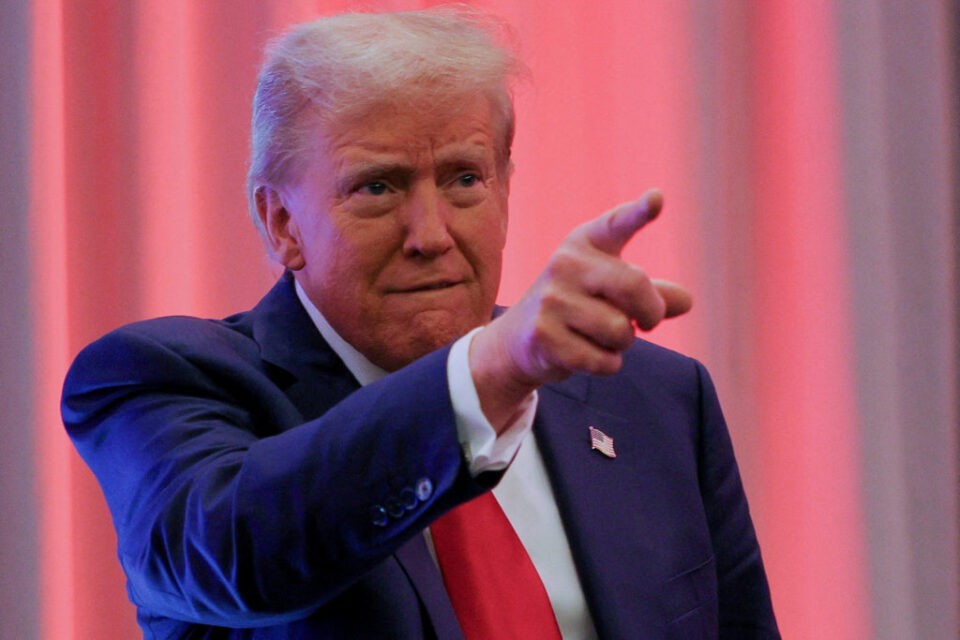In a surprising and tense exchange at a hastily arranged meeting last Friday at Mar-a-Lago, President-elect Donald Trump suggested to Canadian Prime Minister Justin Trudeau that Canada should consider becoming the 51st state of the United States. This extraordinary suggestion came amid heated discussions about border security, trade deficits, and the looming threat of a 25% tariff on Canadian goods.
The meeting, which sources described as “cordial yet intense,” was prompted by Trump’s recent threats to impose sweeping tariffs on Canada and Mexico. The tariffs, Trump argued, were necessary to address what he called Canada’s failure to curb the flow of illegal immigrants and drugs across the border into the U.S. The tariff proposal, Trudeau warned, could devastate Canada’s economy, leading to the emergency visit to Trump’s Florida resort.
A High-Stakes Discussion
According to two attendees at the table, the dinner began with light banter but quickly turned to serious matters. Trump wasted no time addressing his grievances, accusing Canada of being a conduit for illegal immigration and drug trafficking. He claimed that individuals from over 70 countries were entering the U.S. through the northern border due to Canada’s lax border policies.
The president-elect also honed in on the U.S.-Canada trade deficit, which he estimated to exceed $100 billion annually. Trump described the imbalance as “unacceptable,” accusing Canada of taking advantage of the U.S. to the detriment of American workers and businesses.
Sources say Trudeau, while maintaining a composed demeanor, defended Canada’s economic policies and emphasized the interdependence of the two nations’ economies. He warned that a 25% tariff on Canadian goods would not only harm Canada’s economy but also negatively impact American industries reliant on cross-border trade.
Trump’s 51st State Proposal
It was during this heated exchange that Trump made his now-infamous suggestion: “If Canada’s economy cannot survive without ripping off the U.S. to the tune of $100 billion, maybe it should become the 51st state,” he reportedly said. The room fell silent for a moment before Trudeau and others laughed nervously, unsure if the comment was serious or meant as hyperbole.
Trump didn’t stop there. “Prime minister is a nice title,” he added, “but you could still be the governor of the 51st state.” Someone at the table remarked that Canada would likely be a liberal-leaning state, prompting Trump to quip that it could perhaps be split into two states—one liberal, one conservative.
While the lighthearted banter elicited laughter, the underlying message was clear: Trump expects significant concessions from Canada on border security and trade policy by his inauguration on January 20, 2025.
The Stakes for Canada
The stakes for Canada are immense. Trudeau’s government is already grappling with economic challenges and strained relations with the U.S., exacerbated by allegations earlier this year of Indian interference on Canadian soil. A 25% tariff could cripple key industries, including automotive manufacturing, agriculture, and energy exports.
Trudeau reiterated that Canada values its partnership with the U.S. and is committed to addressing shared challenges. However, he pushed back against what he called “unreasonable demands” that would jeopardize Canadian sovereignty and economic stability.
Economic Fallout and Diplomatic Tensions
Deborah Yedlin, CEO of the Calgary Chamber of Commerce, expressed alarm over Trump’s tariff threats. “A 25% tariff on Canadian goods could cost billions of dollars and devastate industries on both sides of the border,” she said. Yedlin also warned of the cascading effects on supply chains, agriculture, and energy exports, noting that 78% of Canada’s exports go to the U.S.
Trump’s proposal to revisit the Canada-Mexico Free Trade Agreement (CMFTA), set for renegotiation in 2026, has added further uncertainty. Both Trump and Vice President-elect Kamala Harris have expressed skepticism about the current trade framework, raising concerns about potential protectionist policies that could further strain bilateral relations.
Public Reaction and Political Implications
The meeting has sparked widespread debate in both countries. Social media users in Canada expressed a mix of outrage and disbelief at Trump’s comments, while some in the U.S. praised his firm stance on trade. Political analysts noted that Trump’s comments, while provocative, were likely intended to pressure Canada into making concessions.
Trudeau, for his part, has remained tight-lipped about the specifics of the meeting but emphasized Canada’s commitment to maintaining a strong and respectful relationship with the U.S. In a statement, he reiterated the importance of cooperation and mutual benefit in addressing shared challenges.
Looking Ahead
As the January 20 deadline approaches, all eyes are on Ottawa and Washington. Trump’s demands for trade and border policy reforms could set the tone for U.S.-Canada relations for years to come. Whether Canada is willing—or able—to meet these demands remains to be seen, but the conversation has already highlighted the deep interdependence and complex dynamics between the two nations.
For now, the idea of Canada as the 51st state may remain a provocative hypothetical. But the meeting at Mar-a-Lago underscores the high stakes and heightened tensions shaping the future of North American diplomacy.

